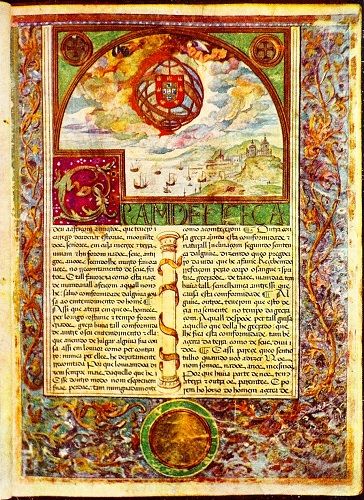Obras de referência da cultura portuguesa
"CRÓNICA DE D. JOÃO I"
UM SÓ CORAÇÃO EM DIREÇÃO AO FUTURO, de FERNÃO LOPES
Análise de Miguel Real
Tradução de Alexandra Leitão

Na Crónica de D. João I (primeira e segunda partes) concentram-se os dois temas que elevam Fernão Lopes (c.1380 – c.1459) a singular cronista dos finais da nossa Idade Média: o lugar privilegiado concedido à História e ao Povo. As narrativas de Fernão Lopes, mormente a referida, alteram radicalmente a conceção então praticada de história, abandonando a narração das linhagens míticas e das aventuras fabulosas e sobrenaturais próprias da Crónica Geral de Espanha, de 1344, e do Livro de Linhagens do Conde D. Pedro, bem como a história das gestas relatadas ao modo da “matéria da Bretanha, como o Livro de José de Arimateia ou a Demanda do Santo Graal, para introduzirem UM novo conceito de História enquanto relato empírico e vivencial de situações sociais conflituosas, uma narrativa preocupada tanto com o rigor documental quanto com o confronto de versões, trazendo para a construção da história a escrupulosa minúcia verificante do tabelião-mor, que Fernão Lopes também foi.
Com este o escrúpulo do rigor na história, e dando-lhe sangue, carne e nervos, Fernão Lopes introduz igualmente na literatura portuguesa o horizonte popular ou as aspirações coletivas e os movimentos sociais vinculados ao crescimento urbano que Portugal sofrera desde D. Diniz.
De origem burguesa, de não elevados rendimentos, fazendo um com a mentalidade simultaneamente europeísta e africanista da nova corte de Aviz, que a batalha de Alfarrobeira inclinará para o prosseguimento desta última vertente, escrivão de D. João I, de D. Duarte e do infante D. Fernando (o “Infante Santo”), Fernão Lopes é elevado ao cargo de guarda-mor da Torre do Tombo a partir de 1418. Neste sentido, A Crónica de D. João I constitui-se simultaneamente, enquanto bloco narrativo, como a nossa certidão de óbito do final da medievalidade e a explosão de força anímica coletiva que conduzirá diretamente à empresa dos Descobrimento. Neste sentido, a Crónica de D. João I estatui-se como um livro charneira da nossa historiografia, evidenciando a passagem entre o fim da dinastia borgonhesa, a primeira dinastia, de espírito cruzadístico e templário, caldeada nas lutas da Reconquista, e a nova nobreza nascida à sombra da dinastia de Aviz, não menos intrépida e aventureira, como os subsequentes Descobrimentos o provarão, mas cuja visão assenta na racionalização fria dos domínios da Coroa, sentido da ação régia de D. João II e D. Manuel I.
Do mesmo modo, a Crónica de D. João I espelha narrativamente uma das imagens míticas da nossa história: o momento da plena fusão entre as pulsões populares e a elite cavaleiresca vitoriosa de Aljubarrota, refundando o Estado e consolidando a independência face a Castela. Neste sentido, a descrição dos movimentos da arraia miúda aquando da morte de D. Fernando concorrem com a defesa das teses jurídicas de João das Regras nas Cortes de Coimbra sobre a legitimidade do mestre de Aviz para ascender ao trono, como se, com exceção da antiga nobreza em que a I Dinastia se cristalizara, Portugal pulsasse a um só coração em direção a um só futuro. O que nos atrai hoje nesta crónica de Fernão Lopes é menos a história real e mais a chama e o resplendor desta tão bem sucedida união nacional entre mesteirais (artífices), burgueses e nobres sob a direção de um só chefe político (D. João) e um só chefe militar (D. Nuno Álvares Pereira).
Comprometido com a nova corte, não causa espanto, assim, que Fernão Lopes confira aos seus relatos históricos um empenhado vigor nacionalista, de que ressalta a imagem de Aljubarrota como uma nova carta de nascimento do país e a nova situação política como a realização da “sétima idade do mundo”, nacionalismo igualmente patente nas condições materiais da escrita da Crónica de D. João I, redigida pelo “guarda-mor” da Torre do Tombo, que aufere uma “tença” para se dedicar integralmente à escrita da história de Portugal, desde D. Afonso Henriques a D. João I. Dito de outro modo, em momento de criação de uma nova dinastia régia, as crónicas de Fernão Lopes, e mormente as duas primeiras partes da Crónica de D. João I revelam a necessidade de uma legitimação histórica do novo poder saído de uma insurreição popular e de um corte radical com a tradição dinástica.
"CRÓNICA DE D. JOÃO I" - ONE HEART ON THE ROAD TO THE FUTURE by FERNÃO LOPES
Crónica de D. João I (first and second parts) concentrates the two themes that raise Fernão Lopes (ca 1380–ca 1459) to the position of unique chronicler of our late Middle Ages: the privileged place granted to history and to the people. The narratives of Fernão Lopes, in particular the one mentioned, radically alter the contemporary conception of history, abandoning the narration of the mythical lineages and the fabulous and supernatural adventures of Crónica Geral de Espanha, 1344, and of Livro de Linhagens by Count D. Pedro, as well as the history of the heroic deeds related in the mode of the Matter of Britain, such as Livro de José de Arimateia or Demanda do Santo Graal. Instead, they introduce a new concept of history as an empirical and experienced tale of conflictive social situations, a narrative concerned both with documentary accuracy and with the confrontation of versions, bringing to this construction of history the strict detailed verification peculiar to notaries, which was Fernão Lopes’s other occupation.
Together with this regard for the accuracy of history but padded out with blood, flesh and nerves, Fernão Lopes also introduces into Portuguese literature the popular horizon or the collective aspirations and social movements linked to the urban growth that Portugal had experienced since the reign of D. Diniz.
Fernão Lopes was of middle class origin, had an average income, and was at one with the simultaneously Europeanist and Africanist mentality of the new court of Aviz, the latter mentality coming to the fore after the battle of Alfarrobeira. He was also a scribe of D. João I, D. Duarte and Prince D. Fernando (the “Holy Prince”) and in 1418 was promoted to the position of Chief Warder of Torre do Tombo (the Portuguese Record Office). In this sense, as a narrative bloc Crónica de D. João I is simultaneously the death certificate for the end of the Middle Ages and the explosion of the collective animist force that will lead directly to the enterprise of the Discoveries. In that sense, Crónica de D. João I constitutes a pioneering book of our historiography, highlighting the transition between the end of the first or Burgundian dynasty, with its crusading and Templar spirit, tempered by the struggles of the Reconquest, and the new nobility born in the shadow of the no less intrepid and adventurous dynasty of Aviz, as proven by the subsequent Discoveries, but whose vision is centred on the cold rationalization of the dominions of the Crown, embodied in the royal actions of D. João II and D. Manuel I.
Similarly, Crónica de D. João I narratively mirrors one of the mythical images of our history: the moment of full fusion between popular pulsions and the victorious chivalrous elite of Aljubarrota, refounding the State and consolidating our independence vis-à-vis Castile. In this sense, the description of the movements of the rabble on the death of D. Fernando rival the defence of the legal theses of João das Regras at the Coimbra Cortes on the legitimacy of the Master of Aviz to ascend the throne, as if, excepting the old nobility on which the first dynasty had become crystallised, Portugal beat with only one heart in the direction of only one future. What attracts us today in this chronicle by Fernão Lopes is less the real story and more the flame and splendour of this well-succeeded national union between artisans, bourgeoisie and nobles under the direction of one sole political leader (D. João) and one sole military leader (D. Nuno Álvares Pereira).
It is no wonder that Fernão Lopes, compromised with the new court should give his historical tales a strongly nationalistic bent where the image of Aljubarrota stands out as a new birth certificate of the nation, and the new political situation as the realisation of the “seventh age of the world”. This nationalism is equally present in the material conditions under which Crónica de D. João I was written, by the Chief Warder of Torre do Tombo, who receives an annuity to dedicate himself fully to writing the history of Portugal from the time of D. Afonso Henriques to that of D. João I. In other words, at the time of the creation of a new royal dynasty, Fernão Lopes’ chronicles and in particular the first two parts of Crónica de D. João I show the need for a historical legitimation of the new power emerging from a popular insurrection and from a radical cut with the dynastic tradition.
Obras de Referência da Cultura Portuguesa
projeto desenvolvido pelo Centro Nacional de Cultura
com o apoio do Ministério da Cultura


 Divulgue aqui os seus eventos
Divulgue aqui os seus eventos













